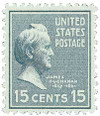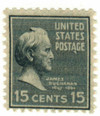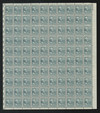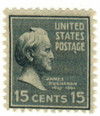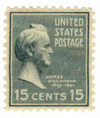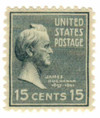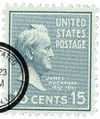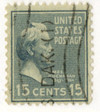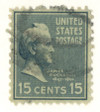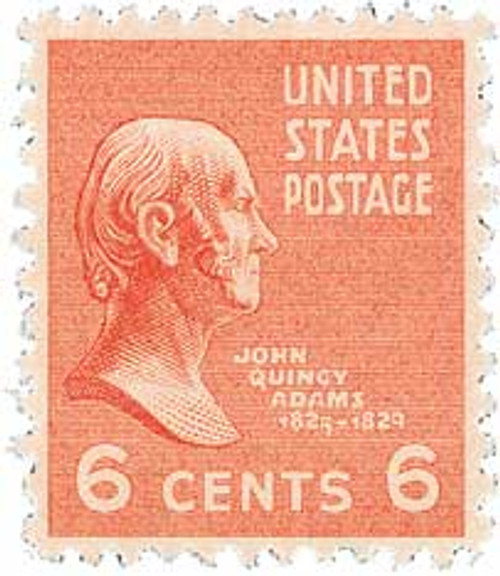
# 820 - 1938 15c Buchanan, light blue
James Buchanan was the only President who never married. Buchanan's niece, Harriet Lane, assumed the duties of the First Lady. When the Prince of Wales (later King Edward VII) came to visit, several spectacular receptions and balls were held in his honor. During the royal stay, President Buchanan slept in the hallway - to provide his guests with suitable rooms.
First Shots Of The Civil War?
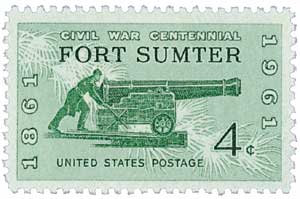
On January 9, 1861, Southern rebels fired on an American ship attempting to resupply Fort Sumter. Some consider these to be the opening shots of the Civil War.
After South Carolina seceded from the Union on December 20, 1860, the locals demanded that the Federals leave the garrison at Fort Sumter. Though President James Buchanan refused to evacuate the fort, he also decided not to take any action that might incite a riot among the Southerners.
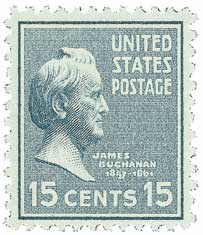
However, the fort’s commander, Major Robert Anderson, and his 80 soldiers were running low on supplies. President Buchanan decided to send a civilian ship, the Star of the West, instead of a military vessel, to avoid tension. This ship was loaded with food, small arms, and about 200 men.
The Star of the West departed New York on January 5, 1861. Shortly after, Secretary of War Joseph Holt received word that the supplies were not needed immediately and that secessionists had set up guns overlooking Charleston Harbor. Holt realized the ship was now in danger and attempted to have it brought back, but was unable to reach it.
Fearing this was the assault they’d expected since secession, rebels rushed to Charleston by the thousands to man shore batteries and fire at the ship. Among those assembled were young men from the Citadel, South Carolina’s military academy. On January 9, the ship entered the channel, not knowing the danger that awaited. George E. Haynsworth, a Citadel cadet stationed at the Morris Island battery, fired two shots at it. More shots followed, with only one causing minor damage.
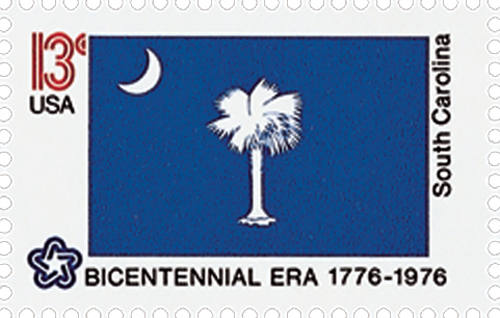
At Fort Sumter, Anderson watched the action but chose not to intervene, as that may have sparked an all-out battle. Eventually, the ship’s captain abandoned the mission and returned to New York. Months later, the Star of the West was captured by Confederates who later sunk it. The ship’s owners received $175,000 from the US government for their loss after the war ended.
James Buchanan was the only President who never married. Buchanan's niece, Harriet Lane, assumed the duties of the First Lady. When the Prince of Wales (later King Edward VII) came to visit, several spectacular receptions and balls were held in his honor. During the royal stay, President Buchanan slept in the hallway - to provide his guests with suitable rooms.
First Shots Of The Civil War?

On January 9, 1861, Southern rebels fired on an American ship attempting to resupply Fort Sumter. Some consider these to be the opening shots of the Civil War.
After South Carolina seceded from the Union on December 20, 1860, the locals demanded that the Federals leave the garrison at Fort Sumter. Though President James Buchanan refused to evacuate the fort, he also decided not to take any action that might incite a riot among the Southerners.

However, the fort’s commander, Major Robert Anderson, and his 80 soldiers were running low on supplies. President Buchanan decided to send a civilian ship, the Star of the West, instead of a military vessel, to avoid tension. This ship was loaded with food, small arms, and about 200 men.
The Star of the West departed New York on January 5, 1861. Shortly after, Secretary of War Joseph Holt received word that the supplies were not needed immediately and that secessionists had set up guns overlooking Charleston Harbor. Holt realized the ship was now in danger and attempted to have it brought back, but was unable to reach it.
Fearing this was the assault they’d expected since secession, rebels rushed to Charleston by the thousands to man shore batteries and fire at the ship. Among those assembled were young men from the Citadel, South Carolina’s military academy. On January 9, the ship entered the channel, not knowing the danger that awaited. George E. Haynsworth, a Citadel cadet stationed at the Morris Island battery, fired two shots at it. More shots followed, with only one causing minor damage.

At Fort Sumter, Anderson watched the action but chose not to intervene, as that may have sparked an all-out battle. Eventually, the ship’s captain abandoned the mission and returned to New York. Months later, the Star of the West was captured by Confederates who later sunk it. The ship’s owners received $175,000 from the US government for their loss after the war ended.




